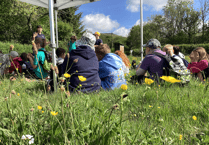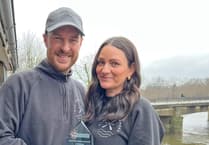Radnorshire Wildlife Trust has launched a rivers appeal, asking for help to raise 50k to support their work in protecting rivers for future generations.
Radnorshire is home to the Lugg (Llugwy). Marteg and Ithon are all tributaries of the River Wye (Afon Gwy). Flowing from mid-Wales to the Severn estuary in England, it's one of the UK’s longest watercourses and is impacted by everything that happens in its large catchment.
But Radnorshire Wildlife Trust are worried about the future of the rivers, saying they are in trouble. Current reports on Wales's rivers show that less than half of them meet Good Ecological Status, with algal blooms causing devastation to river ecosystems.
The crisis can be seen in the death of fish and insects. Both the River Lugg (Afon Llugwy) and the River Wye (Afon Gwy) were recently downgraded in status in England to ‘unfavourable declining’, with the Lugg (Llugwy) quoted as continuing to decline. A combination of wastewater treatment and poor agricultural practice is the main reason for the rivers’ decline in Wales. The state of nature report states starkly that nearly 1 in 5 species are threatened with extinction in Wales.
The Wildlife Trusts are calling for at least 30% of rivers to be connected and protected for natures recovery by 2030. There are three active projects that are working to protect rivers in Radnorshire:
The Wye Adapt to Climate Change? (WACC) project focuses on recovering nature and creating a climate-resilient landscape within the River Wye and its catchment.
The Wilder Lugg project aims to empower the local rural community to bring about a long-term vision for the health and maintenance of the river Lugg.
The overall purpose of the Wye Now? Project is to deliver on the trusts Campaign and Advocacy ambitions around the River Wye, rivers and water management within the upper catchments, championing a clear vision and messaging around the social, health, economic and wellbeing benefits of clean and healthy rivers with well managed water supplies.
To find out more and to contribute to the appeal head to: Nature Recovery Fund: Help Radnorshire's Rivers! | Radnorshire Wildlife Trust (rwtwales.org)





Comments
This article has no comments yet. Be the first to leave a comment.